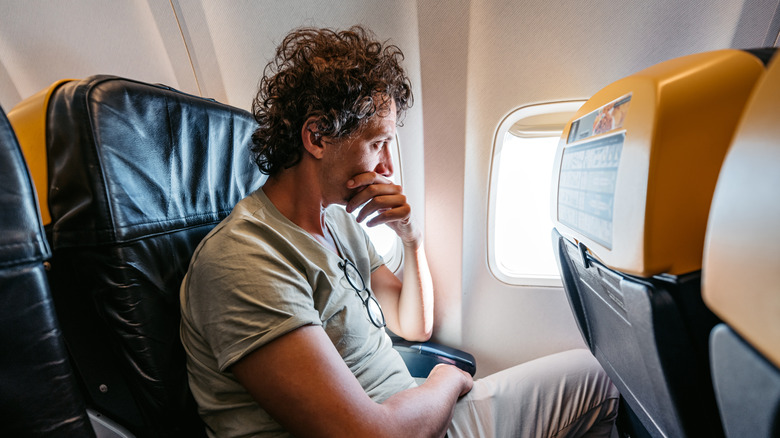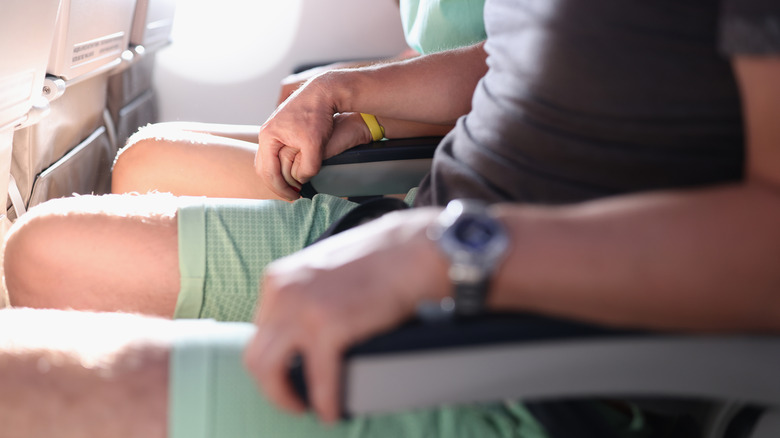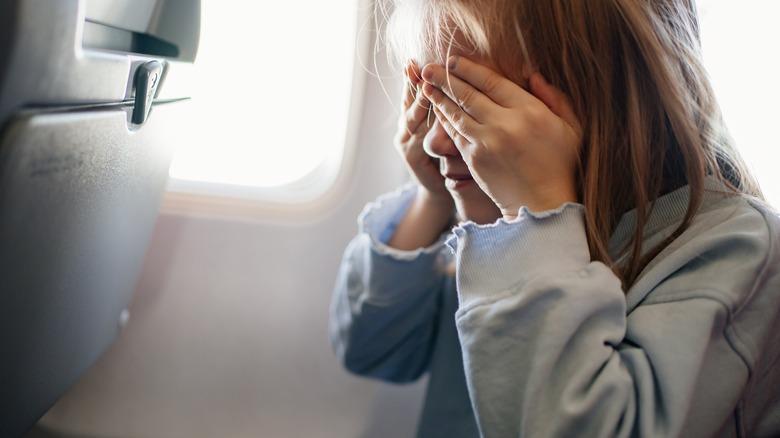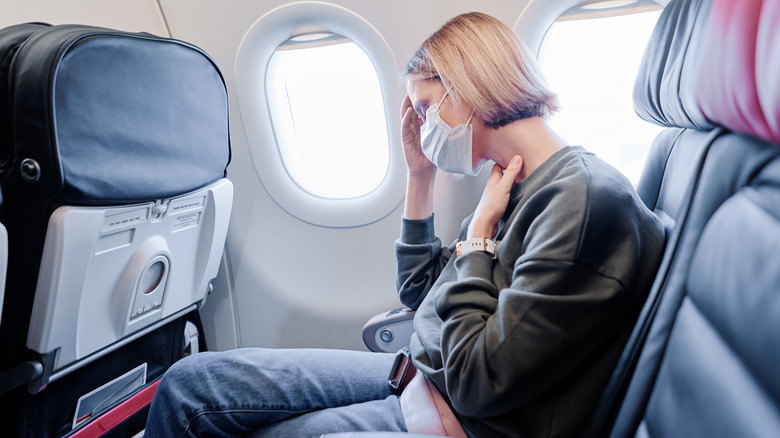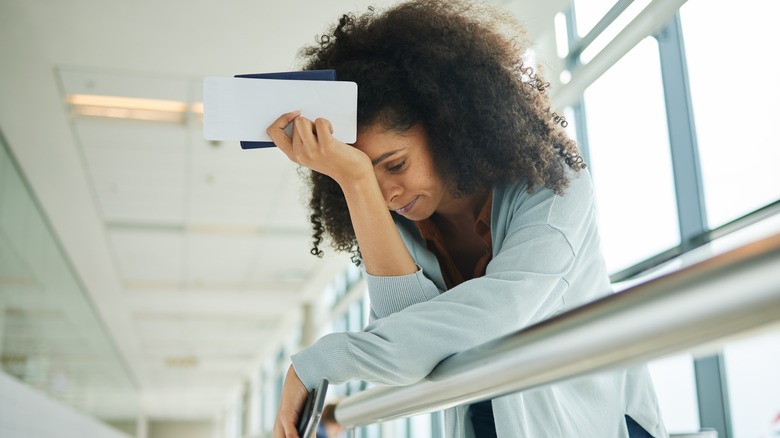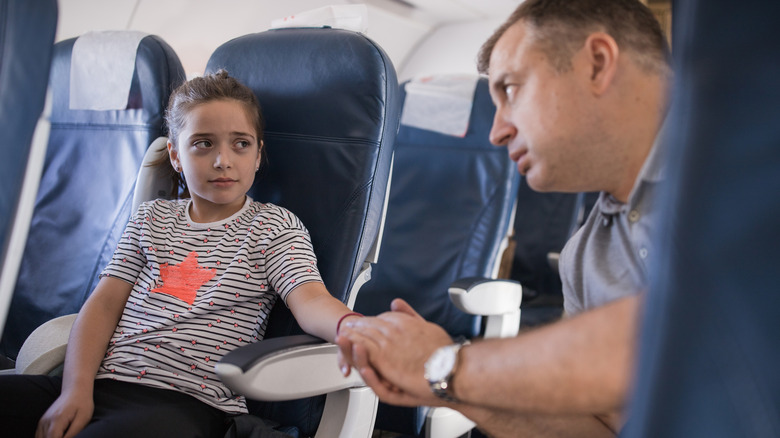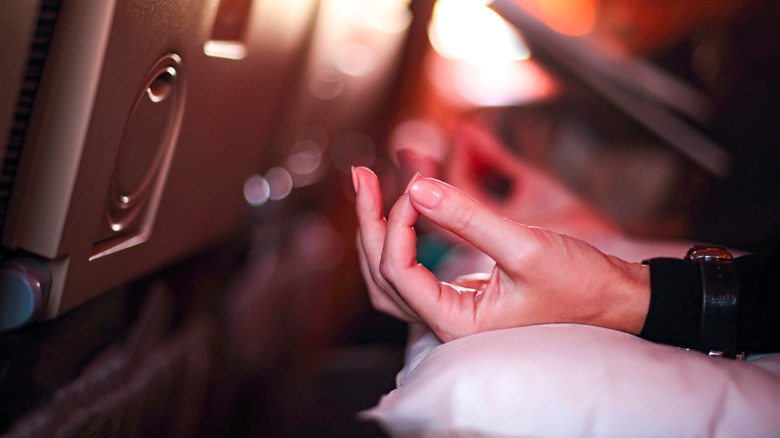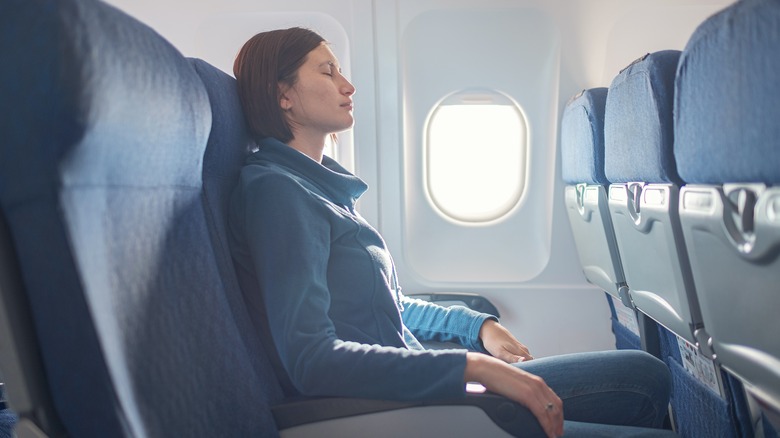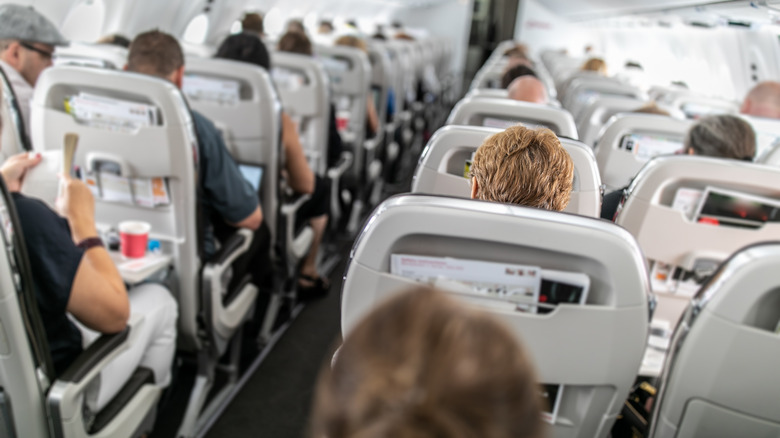A Psychologist Gives Us The Best Tips To Overcome Your Fear Of Flying
We may receive a commission on purchases made from links.
Whether you love sightseeing or vacations spent lounging on a tropical beach, many destinations require you to fly. However, if you have a fear of flying, it can limit your vacation options, keep you from work events, or prevent you from traveling to see family and friends. Sure, you could choose a different method of travel, like a train or car, but it takes longer and can cut into your precious time off. Perhaps you're able to get on a plane, but the anxiety causes you to miss out on the relaxation you need or keeps you from being present if you need to work. Maybe you're okay with flying, but you're traveling with a partner, a friend, or a child who is dealing with this fear.
We recently spoke to Dr. Janina Scarlet, clinical psychologist, owner of superhero-therapy.com, and author of "Unseen, Unheard, Undervalued: Managing Loneliness, Loss of Connection and Not Fitting In" and many other books about why some of us are afraid to fly, some of the causes for this fear, what you can do to comfort other nervous fliers, and steps you can take to overcome this yourself.
Dealing with the loss of control
We asked Dr. Scarlet if this fear occurs because humans don't naturally fly or for another reason. She said, "In my understanding, it seems like some people have it and some people don't. And for some people, it's ... something they learned socially by seeing other people being afraid. For some people, perhaps they had, for example, a panic attack on an airplane, or maybe in another situation, they felt trapped and felt like they couldn't leave. For other individuals, there might be some traumatic experiences that are associated with it, maybe feelings of loss of control regardless for many individuals."
She explained that people sometimes believe that there is more danger than there actually is. Often, it's a fear of a lack of control over the situation: " ... more commonly, there is a fear of not being in control, such as the fear of having a panic attack and not being able to leave."
Sometimes flying makes us consider how strange it is to be on the other side of the country in a few hours. We wondered if this led to a sort of cognitive dissonance that might contribute to the fear. Dr. Scarlet said that while that can be true for some people, " ... the bigger issues really have to do with feeling out of control with worrying about maybe passing out or not being able to step out, or being uncomfortable with tight spaces that seem to be a lot more common for some individuals."
The stages of flight anxiety
If you haven't ever flown, you may not know what to expect or if you'll be afraid at all. We asked Dr. Scarlet about how this fear can manifest. She explained that while some details are specific to individuals, there are things that are common. "For many folks, there might be an increased heart rate, feelings of dizziness, feelings of maybe tightening all over their body and having thoughts such as, 'I'm going to pass out,' or 'I'm going to cause a scene,' or 'Everybody's going to see,' or 'I won't be able to get out.' Those tend to be the most common symptoms that many of the people I work with report."
However, Dr. Scarlet said that fainting isn't actually that likely when you're having a panic attack. She said, "We're more likely to faint when our blood pressure drops, such as if we're donating blood or if we haven't eaten for a few days. But when we're having a panic attack, our blood pressure actually goes up, making it a lot harder for us to faint. The reason why we feel as if we might pass out is because we're feeling out of breath."
Focusing on the breath and treatment
Dr. Scarlet explained that it all goes back to the breath. " ... when we're having a panic attack, one of the best things we can do to manage the situation is to focus on our breath, to focus on just the sensation of the breathing ... actually, for many people, after a few minutes, those feelings start to reduce, having something of a tangent to focus on, such as the sensation of our feet or maybe noticing different colors that are present in the cabin or different sounds that we can hear, can also be a helpful grounding exercise."
What if you haven't flown before? We asked Dr. Scarlet about what to look for. She said, "I think for some individuals who maybe have not flown before, just noticing how they might feel in certain situations, for example, in tight spaces or in a crowded situation. And if folks have difficulty with anxiety or panic attacks in those situations, chances are they might also have anxiety when they're flying. That's not a bad thing because when we learn to manage one of these situations, it's a lot easier to then manage another and anxiety about flying. Flying phobia is treatable, so I highly recommend that folks who are experiencing this difficulty contact a therapist that has experience in treating flying phobias. Ideally, therapists that end up doing exposure therapy where it would lead to assisting the client with flying."
What to look for and how fear of flying can be treated
That's important to remember. Anxiety about flying is treatable. Dr. Scarlet said she has clients who have dealt with this and she works with them to overcome it. She spoke about some of the treatment options she uses in her practice. "I do fly with my clients as an exposure, and so we'll do practice exercises in the sessions, such as imagining flying together. If possible, we do virtual reality exposure where clients can see themselves on an airplane but in virtual reality goggles. And then eventually we do get on the plane, and we fly together, where a client can experience what it means to fly, have a panic attack (possibly), and also to be able to see that, no matter what happens, they can handle it."
Just knowing that this is something that can be treated may give some people hope. However, sometimes we're not the ones flying with this particular anxiety. Often, it can be one of our friends or family members, or even a stranger who is assigned to your seating row.
What to do if your seatmate is having anxiety
What can you do if you're flying with someone who is having a rough time? Dr. Scarlet says that choices are helpful. "I often recommend that we give other people choices such as [saying], 'Would you like me to hold your hand through it?,' or 'Would you like me to distract you?," or 'Would you like to be left alone during this time?' I think giving people some choices can be helpful. For some individuals, they just want to be left alone, and they may want to focus on their breathing exercises or their own mindful activities. For other individuals, they [might] really appreciate a distraction, maybe a conversation that would allow them to ultimately be more mindful and more present, but would also allow their anxiety symptoms to settle. And for some folks, touch, such as holding their hand, can help them to feel better."
Touch can be helpful if someone is comfortable with that. Dr. Scarlet explained, "Many people think that holding someone's hand is a purely physical response. But actually, that's not true. When we have somebody holding our hand — ideally a loved one, but even a stranger, — our body releases this really amazing chemical called oxytocin that creates a soothing effect. It actually soothes our anxiety. It reduces our heart rate over time, and it can even reduce our pain sensation. Holding someone's hand when they're having a panic attack or maybe when they're having a painful procedure can be a lot more helpful than we might realize."
Tips that can help with flight anxiety
We asked Dr. Scarlet if research on the mechanics and science of flying could be helpful. She said that it can be for some, but for others, it can be counterproductive. She said, "I've had some of my clients who were engineers, and for some of them, it was very helpful. But I also find that for some individuals, especially people who have generalized anxiety disorder or OCD, sometimes that can become a trap because they might be just looking for all kinds of things that can go wrong, and that might actually spike their anxiety."
Some airlines have in-flight mindfulness sessions and meditation, like JetBlue's partnership with Open. We asked if things like this can be helpful and if that might be a factor when choosing an airline. Dr. Scarlet said, "Yes, and I also recommend that folks try using that meditation before they fly as well, just to get used to it. For some folks, that can be very helpful. I'm a big fan of meditation and all mindfulness practices. But I do recommend that folks try to practice before they fly, even if it's a slightly different meditation practice, because, once we're comfortable with the idea of meditation, once we've done it a couple of times, then it can be a lot more beneficial to try it [versus trying it] when we're anxious because it's not the first time we're utilizing a new technique."
Trying new techniques
Dr. Scarlet had some reassurance for people who might not think meditation is for them. She said, "Many people are hesitant to try it because they think that in order to meditate, we must be able to fully focus on every moment or our mind has to go blank, but that's not true. Doing a meditation is no different than watching a movie. Sometimes, our minds will wander, and we'll get distracted, and that's okay. Then we just shift back to — whether it's a guided practice, or focusing on our body, or whatever the process is. The idea is, the more we practice, the more comfortable we might become with this practice and the easier it might be to then utilize the in-flight meditation.
"Some people aren't afraid to fly in general, but a bout of turbulence may bring up an unexpected reaction. Dr. Scarlet mentioned a few techniques that can help. She said, "If there's somebody whose hand you can hold, that can be helpful. But, I think focusing on any sensations that are available to you — for example, noticing the sensation of your hands, such as holding your own hand or holding on to the hand rest can be helpful. It could be grounding, noticing the sensation of our feet if that sensation is available to us, or maybe noticing the sensation of our lips, or maybe swallowing some saliva that's in our mouth or taking a sip of water. Any physical sensation can be really grounding in those moments."
Don't forget to celebrate getting through a flight
She added that noticing physical sensations allows you to "notice that in this very moment, right now, I might be feeling scared, but I'm okay." We also asked what to do as a follow-up once the plane lands and you're back on the ground. She said, "I think that any attempt at flying is a success, even if we had a panic attack, even if we had to get off the plane before flying — just even taking that step, that is already a success. And after the flight is over, I think, first of all, celebrating in terms of, hey, you've just faced a really big challenge, right? And you've succeeded.
"So, taking a moment to celebrate and maybe noticing what our needs are. For many people, after we've had some anxiety-provoking event happen, or if we've had a panic attack, we might need to eat, we might need to rest, we might need to use the restroom, and so really attending to our biological needs if possible, resting a little bit, and again, celebrating ourselves for a job well done."
Dr. Scarlet also shared that this is a thing you can work on. She said, "I just wanted to reiterate that it is treatable — that folks that are treated that use exposure therapy or EMDR (Eye Movement Desensitization and Reprocessing) can often be helpful as well. So for people who have a fear of flying, I just wanted to say, please know that you're not alone. Please don't despair. It does get better, and please know that help is out there, and it's available."
If you or someone you know needs help with mental health, please contact the Crisis Text Line by texting HOME to 741741, call the National Alliance on Mental Illness helpline at 1-800-950-NAMI (6264), or visit the National Institute of Mental Health website.
